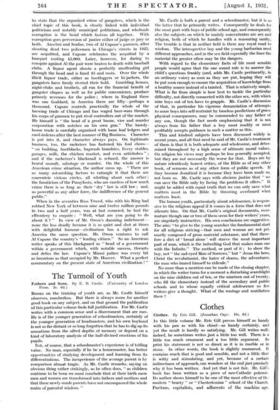Clothes
Clothes. By Eric Gill. (Jonathan Cape. 10s. 6d.) IN this little volume Mr. Eric Gill proves himself as handy with his pen as with his chisel—as handy certainly, and yet the result is hardly so satisfying. Mr. Gill writes well ; indeed, he sometimes writes just a little too well. There is a little too much ornament and a too little argument. In print his statement is not so direct as it is in marble or in stone. In other words, the book is slightly mannered. It contains much that is good and sensible, and not a little that is witty and stimulating, and yet, because of a certain indirectness of approach, one wonders at the end just precisely why it has been written. And yet that is not fair. Mr. Gill's book has been written as a piece of neo-Catholic polemic. Its author shows himself to be one of the most effective of th modern " hearty " or " Chestertonian " school of the Church. Puritans, capitalists, and adherents of the machine age,
Philistines, spoil-sports, agnostics, are his phobias. In a word, he has all the correct aversions. In the last analysis, it may be presumed that this is the fundamental cause of our certain dissatisfaction. His book is brilliant, but it is deeply unoriginal.
And yet, when these preliminary, if fundamental, cavils are over, there is very much which we can enjoy in Mr. Gill's book. Here is a passage, for example, to illustrate the almost mediaeval clarity, nay, the scholasticism, of Mr. Gill's logic.
" Tastes differ, but not right tastes, just as moral notions differ, but not right moral notions ; and the question as to what is right in art is no more and no less difficult than the question as to what is right in morals. The only difficulty is one of dialectical exposi- tion. Granted a rational being and one of normal sensibility, good taste, and that is to say right taste, as also good and right morals may be expected as a matter of course. If we have bad taste or bad morals it is because people are insensitive or irrational."
It must, indeed, be comforting to be so sure as all that.
With his feet so fast planted on this orthodoxy Mr. Gill is able to make exceedingly pertinent judgements on much of the
modern world. How good, for example, is this description and defence of ornament in building :
" On the other hand, ornament and luxury are not necessarily destructive of pride and grandeur. The church of St. Mark at Venice is not notoriously plain, and the North Porch of the cathedral of Chartres is still one of the grandest exhibitions of man's proper pride. Nevertheless at the present time, and as the inevitable result of nearly two centuries of Industrialism, we have a race of workmen in whom all artistic initiative has been so completely destroyed, in whom there is almost no virtue but that of obedience, that architectural pride and grandeur are not and cannot be the produce of any mind but that of the architect and engineer. It is fortunate then that ornament is not necessary. ' Ornament is the exuberance of good workmanship,' and there is no exuberance in the modern workman except in his spare time. While he is at work exuberance is not called for, not wanted ; it is a hindrance and not a help ; for under modern building conditions accurate obedience is all that is required. For no one of the thousand men who have to mix a thousand tons of concrete or lay two million bricks is there any scope for personal intellectual responsibility. The work is to be done according to plan, and the plan is no affair of theirs. They may be good men—first-class footballers, skilful motor cyclists, even kind husbands—but they are no more good builders than the women who do the typewriting in,the engineer's office. The pride and grandeur of modern building are nothing to do with ornament or the exuberance of the workman. The good modern building is grand in its complete simplicity. It is beautiful, that is to say, pleasing when seen, because it exhibits nothing inharmonious, nothing illogical, nothing vain-glorious. There are not yet many such."
Perhaps we have said and quoted enough to show that no one who is interested in the question of aesthetics in modern life should neglect to read Mr. Gill's little book ; incidentally, if he does, he will deny himself a considerable pleasure.



































 Previous page
Previous page